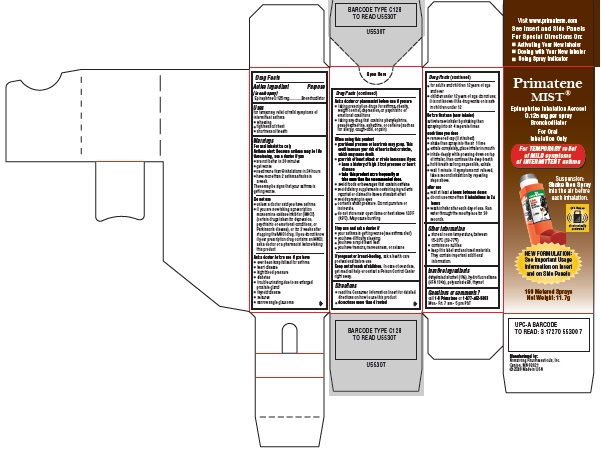Primatene Mist | Epinephrine Inhalation Aerosol while Breastfeeding

What is Primatene Mist | Epinephrine Inhalation Aerosol used for?
Brief: Bronchodilator
Is using Primatene Mist | Epinephrine Inhalation Aerosol unsafe in breastfeeding? Can there be bad consequences for baby if I use it while breastfeeding?

Primatene Mist | Epinephrine Inhalation Aerosol Breastfeeding Analsys
Epinephrine while Breastfeeding
SafeCAS Number: 51-43-4
Used as a systemic drug for cardiac resuscitation and locally in topical anesthetic preparations, epidural anesthesia, eye drops (mydriatic), and nasal drops (vasoconstrictor). At last update no published data on excretion in breast milk were found.Its rapid metabolism (short Tmax and T½) makes it unlikely an excretion into milk in significant amounts. It is destroyed in the gastrointestinal tract. The low oral-bioavailability makes its levels into infant's plasma, that would be absorbed from ingested breast milk, be nil or negligible. Maintained high intravenous doses decrease milk production by interfering with the secretion of prolactin especially the early postpartum-weeks, because when breastfeeding is well established, prolactin levels do not correlate with milk production any longer. No problems related to lactation have been observed due to epidural anesthesia in which adrenaline is used.
Primatene Mist | Epinephrine Inhalation Aerosol Breastfeeding Analsys - 2
Epinephrine while Breastfeeding
CAS Number: 51-43-4
No information is available on the use of epinephrine during breastfeeding. Because of its poor oral bioavailability and short half-life, any epinephrine in milk is unlikely to affect the infant. High intravenous doses of epinephrine might reduce milk production or milk letdown. Low-dose intramuscular (such as Epi-Pen), epidural, topical, inhaled or ophthalmic epinephrine are unlikely to interfere with breastfeeding. To substantially diminish the effect of the drug after using eye drops, place pressure over the tear duct by the corner of the eye for 1 minute or more, then remove the excess solution with an absorbent tissue.
What should I do if already breastfed my kid after using Primatene Mist | Epinephrine Inhalation Aerosol?
It is always a good idea to keep your healthcare provider or doctor informed about your drug usage during pregnancy and breastfeeding but if you have not informed your doctor about Primatene Mist | Epinephrine Inhalation Aerosol and have used it then do not panic as Primatene Mist | Epinephrine Inhalation Aerosol is mostly safe in breastfeeding and should not cause any harm to your baby.
My health care provider has asked me to use Primatene Mist | Epinephrine Inhalation Aerosol, what to do?
Usage of Primatene Mist | Epinephrine Inhalation Aerosol is safe for nursing mothers and baby, No worries.
If I am using Primatene Mist | Epinephrine Inhalation Aerosol, will my baby need extra monitoring?
No
Who can I talk to if I have questions about usage of Primatene Mist | Epinephrine Inhalation Aerosol in breastfeeding?
US
National Womens Health and Breastfeeding Helpline: 800-994-9662 (TDD 888-220-5446) 9 a.m. and 6 p.m. ET, Monday through Friday
UK
National Breastfeeding Helpline: 0300-100-0212 9.30am to 9.30pm, daily
Association of Breastfeeding Mothers: 0300-330-5453
La Leche League: 0345-120-2918
The Breastfeeding Network supporter line in Bengali and Sylheti: 0300-456-2421
National Childbirth Trust (NCT): 0300-330-0700
Australia
National Breastfeeding Helpline: 1800-686-268 24 hours a day, 7 days a week
Canada
Telehealth Ontario for breastfeeding: 1-866-797-0000 24 hours a day, 7 days a week
